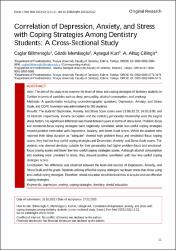| dc.contributor.author | Bilmenoğlu, Çağlar | |
| dc.contributor.author | Memişoğlu, Gözde | |
| dc.contributor.author | Kurt, Ayşegül | |
| dc.contributor.author | Çilingir, A. Altuğ | |
| dc.date.accessioned | 2023-05-11T13:51:53Z | |
| dc.date.available | 2023-05-11T13:51:53Z | |
| dc.date.issued | 2023 | en_US |
| dc.identifier.citation | Bilmenoğlu, Ç., Memişoğlu, G., Kurt, A. ve Çilingir, A. A. (2023). Correlation of depression, anxiety, and stress with coping strategies among dentistry students: A cross-sectional study. Eurasian Journal of Family Medicine, 12(1), 11-12. https://doi.org/10.33880/ejfm.2023120102 | en_US |
| dc.identifier.issn | 2147-3161 | |
| dc.identifier.uri | https://doi.org/10.33880/ejfm.2023120102 | |
| dc.identifier.uri | https://hdl.handle.net/20.500.12511/10940 | |
| dc.description.abstract | Aim: The aim of the study is to examine the level of stress and coping strategies of dentistry students in Türkiye in terms of variables such as sleep, personality, alcohol consumption, and smoking. Methods: A questionnaire including socio-demographic questions, Depression, Anxiety, and Stress Scale, and COPE Inventory was administered to 293 students. Results: The students' Depression, Anxiety, and Stress Scale scores were 13.88±10.03, 14.60±8.98, and 19.41±9.64, respectively. Income perception and the dentistry-personality relationship were the largest stress factors. No significant difference was found between years in terms of stress level. Problem-focus and emotional-focus coping strategies were negatively correlated, while less-useful coping strategies showed positive correlation with Depression, Anxiety, and Stress Scale scores. While the students who reported their sleep duration as "adequate" showed high problem-focus and emotional-focus coping scores, they had low less-useful coping strategies and Depression, Anxiety, and Stress Scale scores. The students who deemed dentistry suitable for their personality had higher problem-focus and emotional-focus coping scores and lower low less-useful coping strategies scores. Although alcohol consumption and smoking were unrelated to stress, they showed positive correlation with low less-useful coping strategies scores. Conclusion: No difference was observed between the level and sources of Depression, Anxiety, and Stress Scale and the grade. Students utilizing effective coping strategies had lower stress than those using less-useful coping strategies. Therefore, dental education should include how to acquire and use effective coping strategies. | en_US |
| dc.language.iso | eng | en_US |
| dc.publisher | Eurasian Society of Family Medicine | en_US |
| dc.rights | info:eu-repo/semantics/openAccess | en_US |
| dc.subject | Anxiety | en_US |
| dc.subject | Coping Strategies | en_US |
| dc.subject | Dental Education | en_US |
| dc.subject | Dentistry | en_US |
| dc.subject | Depression | en_US |
| dc.title | Correlation of depression, anxiety, and stress with coping strategies among dentistry students: A cross-sectional study | en_US |
| dc.type | article | en_US |
| dc.relation.ispartof | Eurasian Journal of Family Medicine | en_US |
| dc.department | İstanbul Medipol Üniversitesi, Diş Hekimliği Fakültesi, Protetik Diş Tedavisi Ana Bilim Dalı | en_US |
| dc.authorid | 0000-0001-5800-5080 | en_US |
| dc.identifier.volume | 12 | en_US |
| dc.identifier.issue | 1 | en_US |
| dc.identifier.startpage | 11 | en_US |
| dc.identifier.endpage | 12 | en_US |
| dc.relation.publicationcategory | Makale - Uluslararası Hakemli Dergi - Kurum Öğretim Elemanı | en_US |
| dc.identifier.doi | 10.33880/ejfm.2023120102 | en_US |
| dc.institutionauthor | Memişoğlu, Gözde | |
| dc.identifier.scopus | 2-s2.0-85153183331 | en_US |
| dc.identifier.scopusquality | Q4 | en_US |


















